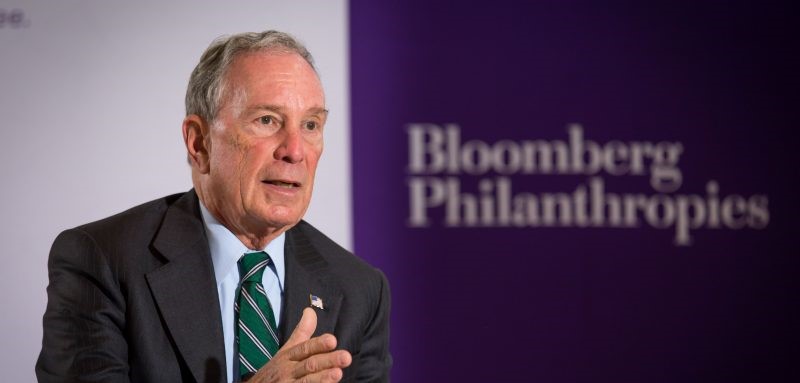A new economic forum?
May 19, 2018 | Expert Insights

Former New York City Mayor Michael Bloomberg has launched a new economic conference that has been described as a potential rival to the WEF. Bloomberg’s New Economic Forum will reportedly focus on studying a changing world order and the effects of China’s rise to the global stage.
Background
Michael Bloomberg is the founder and CEO of the information services and financial data organisation Bloomberg LP. He served three terms as the Mayor of New York City and was in office from 2002 to 2013. In 2016, he backed Democratic nominee Hillary Clinton. As of April 2018, Michael Bloomberg was worth over $53 billion. The CEO has donated over $5 billion to issues such as gun control and climate change. Bloomberg LP was founded in 1981 and is headquartered in New York City. It is a privately held organisation that provides economic and financial news information worldwide.
WEF
The World Economic Forum (WEF) is a Swiss non-profit foundation and one of the most influential international platforms for economic cooperation. It is headquartered in Geneva and was founded in 1971 by Klaus Schwab. Schwab is known for his development of the “stakeholder” management approach which is widely practiced today. The WEF was initially called the European Management Forum and focussed on how European firms could catch up with US management practices.
The WEF expanded after the collapse of the Bretton Woods fixed exchange mechanism and the Arab Israeli War, to include political leaders in 1974. Today, the WEF is “committed to improving the state of the world” by “engaging business, political, academic, and other leaders of society to shape global, regional, and industry agendas". It is best known for its annual meetings in Davos, where it enables businesses, NGOs and political leaders to meet and debate key global issues. The 2018 summit was focussed on "Creating a Shared Future in a Fractured World".
Analysis
The New Economic Forum is a China-focussed platform of discussion. “Davos has been around for a long time: it’s a very big conference and it’s focused on lots of world problems. This conference is focused on the world and China as an emerging power and how we all work together,” Michael Bloomberg told the Financial Times. He noted that it was increasingly important to deepen US understanding of the Chinese, which could “provide a framework of peace and prosperity.” “Otherwise we will divide the whole world into sections and it will lead to a situation comparable to prior to World War I,” Bloomberg said.
Bloomberg has disagreed with Trump’s China policy in the past. Only last month he said that the administration’s new trade policies “would unfortunately harm our economy, would kill jobs, would slow innovation, and strain ties with nations around the world, including China.” In a press release, the company emphasised that it would involve new economic powers such as India, Africa, the Middle East and Latin America. The conference will reportedly address “actionable solutions” to issues such as climate change and inequality.
“The leading global forums to date have been designed from a western perspective,” said Bloomberg Media CEO Justin Smith. “If you think about the future of the global economy and want to assemble key public and private sector leaders, it’s a different community.” The organisation will hold its first two-day meeting in Beijing in November, and will be limited to 400 participants.
Former US Secretary of State Henry Kissinger, Former US Treasury Secretary Hank Paulson, and the China Center for International Economic Exchanges think tank are some key players involved. The advisory board includes Microsoft founder Bill Gates, former Chinese central bank Governor Zhou Xiaochuan, former UN Secretary General Ban Ki-Moon, India’s former central bank governor Raghuram Rajan, Former Australian Prime Minister Kevin Rudd, and Minouche Shafik, Director of the LSE.
Counterpoint
Critics of high-level multilateral organisations such as the WEF have noted that they serve as a platform for the wealthy and elite. They have questioned the WEF’s western-dominated vision for globalisation and said that such talks are unlikely to help redistribute the world's wealth. These platforms have been criticised for failing to promote the interest of real stakeholders and effectively address issues such as poverty and global warming, particularly in developing countries. The WEF has been called “a talking shop without any consequence for world affairs.”
Assessment
Our assessment is that it is important to create platforms that will allow developing countries to have an audible voice in the global discourse. However, the New Economic Forum has the potential to have the same pitfalls that affect other multilateral economic forums. We believe that it will not be easy to replace an established organisation such as the WEF.








Comments